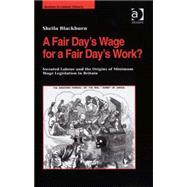
Note: Supplemental materials are not guaranteed with Rental or Used book purchases.
Purchase Benefits
Looking to rent a book? Rent A Fair DayÆs Wage for a Fair DayÆs Work?: Sweated Labour and the Origins of Minimum Wage Legislation in Britain [ISBN: 9780754632641] for the semester, quarter, and short term or search our site for other textbooks by Blackburn,Sheila. Renting a textbook can save you up to 90% from the cost of buying.
| Preface | |
| Introduction | |
| Sweating Revealed, 1843- 90 | |
| The 'discovery' of sweated labour, 1843-50 | |
| The 'rediscovery' of sweating, 1876-90 | |
| The Search for an Effective Solution | |
| Anti-sweating campaigns, 1890-1905 | |
| The turning point of 1906 and the legal minimum wage | |
| The Minimum Wage in Practice | |
| The test case of the 1910 Cradley Heath dispute | |
| R.H. Tawney and the minimum wage | |
| The persistent problem of low pay | |
| Conclusion | |
| Appendices | |
| Bibliography | |
| Index | |
| Table of Contents provided by Publisher. All Rights Reserved. |
The New copy of this book will include any supplemental materials advertised. Please check the title of the book to determine if it should include any access cards, study guides, lab manuals, CDs, etc.
The Used, Rental and eBook copies of this book are not guaranteed to include any supplemental materials. Typically, only the book itself is included. This is true even if the title states it includes any access cards, study guides, lab manuals, CDs, etc.